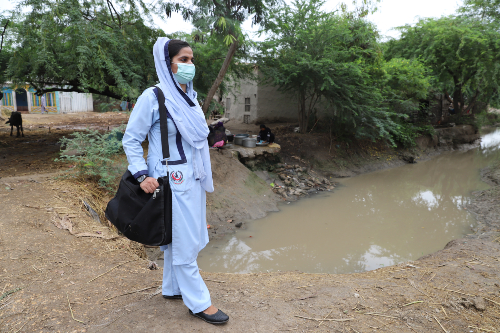News
In Pakistan’s remote areas, midwives ensure care beyond safe birth
- 22 December 2021
News
KARACHI, Pakistan – During the pandemic, 24-year-old Seema moved to Koohi Goth, an urban slum on the outskirts of Pakistan’s largest city, to be closer to her parents.
She had three daughters, the youngest of whom died as a newborn because of the lack of neonatal services in her former neighbourhood of Karachi City, a few miles from the Rehri Goth, coupled with limited prenatal care to address pregnancy complications.
Now she is pregnant again, but this time, she started visiting the midwifery-led care unit at the Koohi Goth Hospital, where she receives regular checkups for free.
A need to improve care
Reproductive, maternal, neonatal, and child health indicators remain poor in Pakistan. Early childbearing and lack of awareness put women at life-threatening risks. In remote areas, health facilities are scarce and births are mostly attended by unskilled midwives, further exacerbating the risk of maternal and child mortality. According to the 2019 Pakistan Maternal Mortality Survey, the maternal mortality rate is 186 deaths per 100,000 live births. (The number is higher in rural areas versus urban areas.)
As other hospitals shut down given COVID-19 restrictions, Koohi Goth Hospital’s doors stayed open to a rising number of visitors. Every day, almost 500 women visit the facility’s outpatient department and on average, five babies are safely delivered. “Hundreds of women visit the facility every day. I sometimes feel tired but these women need us,” says Noor, the facility’s senior midwife whose patients include Seema. “When we help them, we forget our pain.”
The midwives here come from the most underserved communities across Pakistan, including Sindh, Gligit-Balistan and Khyber Pakhtunkhwa. UNFPA provides refresher training as well as Internet-based courses to enhance and expand their skills. UNFPA then works with local governments to deploy them to remote areas to staff Basic Health Units, the main way people access primary health care.
UNFPA is also working with Pakistan National Forum for Women’s Health, a pioneer in midwifery services and obstetric fistula prevention and treatment, to establish three more midwifery-led care units within hospitals in Sindh province. Midwives in these units handle low-risk pregnancies, provide family planning counselling and conduct antenatal and postnatal check-ups, referring more complicated cases to obstetricians/gynaecologists.
Counselling for contraceptives
Neelum is a midwife at Keti Bandar, a remote fishermen village at the old harbour in Thatta district, 150 kilometres away from Karachi. Family planning counselling, information and services “are essential and life-saving, considering the high fertility trends in the coastal communities and short birth spacing, which many times leads to pregnancy complications,” she said.

When patients tell the midwives that their husbands and mothers-in-law pressure them not to use contraception, the midwives invite the husbands to learn about the consequences of repeated pregnancies. “Now, the use of long-acting reversible contraceptives is increasing,” said Neelum, who also makes house calls. “We are also introducing male contraceptives in the communities.”
There is a huge need to develop a cadre of midwives to ensure that women in remote communities receive care and services. UNFPA, with the support of Johnson & Johnson and other partners, is working with federal and provincial health authorities to raise the level of midwifery education and services in Pakistan.
Seema, who gave birth at 17 to her first daughter at home, said, “My mother-in-law prays for my life because a mother’s life is important for little children.”